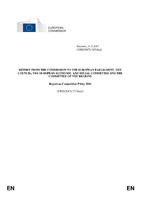| dc.description.abstract | Competition policy is based on legal and economic principles, and it is often associated with those two very important aspects. But this is just a part of what competition policy is about: competition policy has a direct impact on people's lives, and one of its key features is promoting open markets so that everyone –businesses and citizens –can get a fair share of the benefits of growth. In his 2016 Stateof the Union speech, the President of the European Commission Jean-Claude Juncker recalled that "(a) fair playing field also means that in Europe, consumers are protected against cartels and abuses by powerful companies. (...) The Commission watches over this fairness. This is the social side of competition law. And this is what Europe stands for"1. Competition enforcement sends the message that everyone, however rich or powerful, has to play by the rules.Competition policy cannot shape a fairer economy on its own, but it can make an important difference: enforcing competition law ensures that there is a voice for the consumers. Competition policy contributes towards a society that gives people choice, stimulates innovation, prevents abuses by dominant players, and drives companies to make the most of scarce resources thus contributing to addressing global challenges like climate change. In addition, all decisions taken by Europe’s competition enforcers –the Commission and national competition authorities –affirm that the EU is a community based on the rule of law. They also demonstrate to civil society that the system can work for the common good and deliver concrete benefits to citizens.Commission's competition policy actions in 2016 focused on a wide range of policy areas, helping make markets work more fairly for everyone. At the same time, competition policy continued supporting the Commission's efforts to deliver on key political priorities, in particular a connected Digital Single Market, a deeper and fairer internal market, and an integrated and climate-friendly Energy Union. The globalised economy also requires a global competition culture. This is why the Commission is strongly engaging with other EU institutions, international organisations and competition enforcers all over the world. Working together helps to multiply and spread the benefits of fair competition, in Europe and worldwide. |

